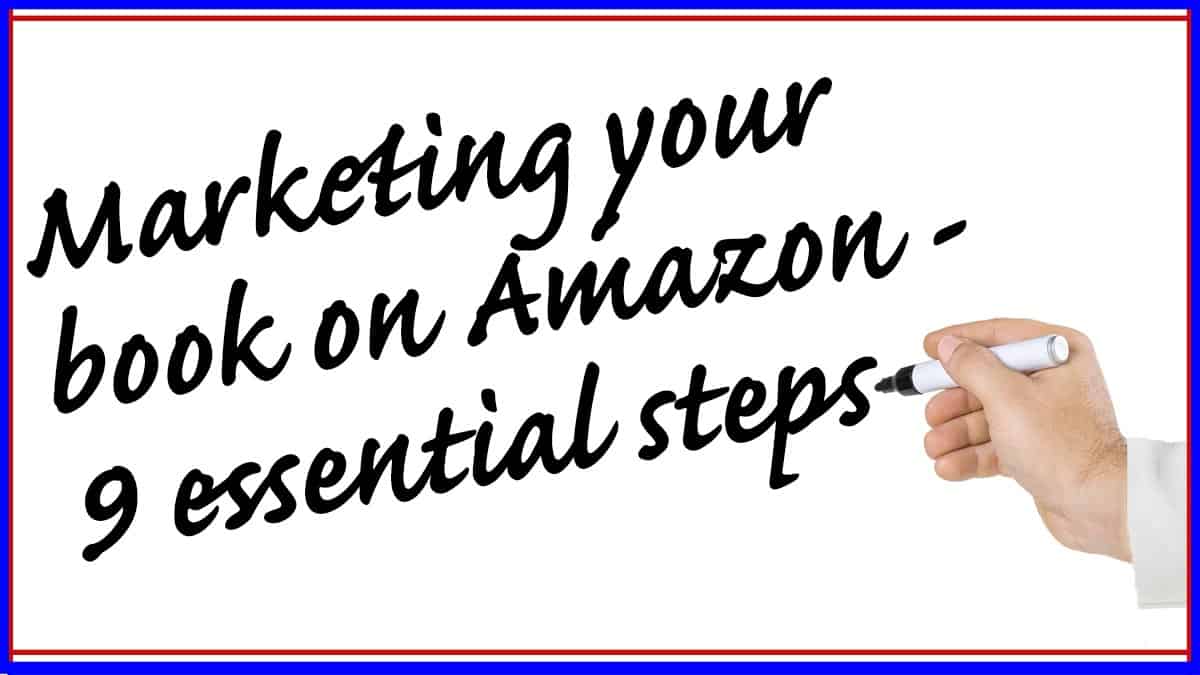How to Build Your Author Platform
Have you begun to build your author platform?
Estimated reading time: 9 minutes
Building an author platform is a must if you want your book to stand out from the one million other books published every year in the United States.
There are lots of authors competing for attention.
Imagine all of these authors—including you—standing shoulder to shoulder on a huge football field, with the book-buying public sitting in the stands.
Each author holds up his or her book and waves it about, hoping to attract attention.
If you happen to be standing on the edges of the field, right near the stands, some people may notice you and your book, and if they’re intrigued by your provocative title or colorful cover, they may purchase it.
If you’re just a little farther back, however, only a few sharp-eyed buyers will notice you.
Most authors, unfortunately, are literally lost in the crowd. But if you build a platform—something you can climb up and stand on—you and your book will be seen by all those folks in the stands.
WHAT IS AN AUTHOR PLATFORM?
In the publishing industry, such a platform is called an author platform—and sometimes a writer’s platform or writing platform. It is made of materials such as these, listed in no particular order:
- Television and radio appearances or your own TV or radio show
- Articles and quotes by or about you in newspapers and magazines, whether actual or virtual
- Your speeches, seminars, book signings, and other public appearances
- Websites—whether yours or others—that mention or feature you and/or your book
- Comments you make on other websites to display your expertise and make people aware of you
- Your blog and podcast, as well as mentions of you on other blogs and podcasts
- Personal pages, business pages, product pages, or other types of pages about you on Facebook, LinkedIn, and other social networking sites, as well as pages, groups, and/or fan clubs for your books
- Comments you make on social networking sites, especially those belonging to groups dealing with the topic of your book
- Your YouTube posts
- Your Twitter tweets
- Press releases
- Your ads, in all forms
- Newsletters, whether physical or electronic
- Other people or organizations who are interested in seeing your book succeed
- And many, many more
It’s many things…
Your author platform consists of all the things you do to make people aware of you and your book. Provided, of course, that these ways are legal, ethical, and consistent with your image.
If you have enough money, you can hire a PR firm to build your platform for you by pitching you to television and radio shows, blogging and tweeting on your behalf, running commercials or ads, writing and distributing a newsletter, and so on.
If you don’t have these dollars to invest, you can do these things yourself.
There is no single element that will guarantee your platform stands tall. Neither is there a sure-fire package of items that will do this.
You will have to try different ways of reaching your audience and developing an author platform through trial and error. You’ll undoubtedly find that a combination of items is required, each reinforcing the others.
Let’s look at eight ways in which you can build an author platform. We’ll start with the easier items and move on to the ones that take longer to accomplish.
How To Build an Author Platform – 8 Key Steps
#1 – Start quick & easy with social sites
Pages about you and/or your book on Facebook, LinkedIn, and similar sites are easy to set up. They are often absolutely free. “Premium” memberships cost money, but you don’t need them to get started; a basic membership will do.
Search for other authors and their books on these sites. When you find them, study their approaches, and borrow their best ideas when developing your own page(s).
Once you belong to one of these sites you can also set up a group, fan club, or something similar for your book.
For example, see the group called “The 7 Habits of Highly Effective People” on LinkedIn. Created for “those who have been influenced by Stephen R. Covey’s book The 7 Habits of Highly Effective People,” this group had 13,599 members as of June, 2019.
There are other LinkedIn groups dedicated to discussing specific books, including “Blue Ocean Strategy” with 11,741 members.
#2 – Add strategic comments
Making comments on social networking sites that focus on the topic of your book is easy, once you join the site.
Suppose you’re a doctor writing a book about cancer. If you type the word “cancer” into the Search Groups box on LinkedIn, you’ll get numerous results, ranging from the “Susan G. Komen” group to “The Leukemia & Lymphoma Society” to the “Ride to Conquer Cancer” group.
Each group has a number of discussions. You can join in by offering insightful comments that demonstrate your knowledge and give hints about you and your book.
You can also move beyond these general sites to find those that specifically address your topic, and comment there.
Beware: heavy-handed promotion in discussion groups usually backfires. It’s best to be helpful and subtle.
#3 – Create an author website
Setting up a website and/or blog is relatively easy to do by yourself. You will, however, have to learn a little bit about website templates, hosting, and a few other matters.
Companies like GoDaddy will secure your domain name and host your website and/or blog. You can even get a simple website or blog template for free.
You can also use WordPress or Wix to set up a free website or blog.
It pays to study other authors and book websites/blogs to get an idea of the possibilities and what might work for you. For example, see the author platform-building websites of:
• Michael J. Deeb, who writes Civil War novels
• Ismael Beah’s A Long Way Gone: Memoirs of a Boy Soldier
• Author W.E.B. Griffin’s numerous novels
• Freakonomics, by Stephen Levitt and Stephen Dubner
These are not necessarily the best author websites ever created. But they do give you an idea of the type and variety of sites used to promote authors and/or specific books.
#4 – Begin tweeting
Tweeting on Twitter is another quick and easy way to develop your author platform.
Simply sign up for an account, then search for and study other users who are interested in the same subject as you, think about what will make you stand out, and begin tweeting.
Remember, however, that simply blasting out tweet after tweet is not the best idea. Emphasize quality instead of quantity, and before you tweet, ask yourself if it truly advances your purpose.
#5 – Send out news releases
The last item in the fairly easy column is press releases.
You can write one or more press releases announcing your book or other newsworthy items. Perfect them, then release them for a fee via services such as CisionPRWeb and Send2Press.
There are also sites that allow you to send out a limited number of press releases for free. There are also sites where, for a fee, you can set up a regular and targeted press-release campaign, if you have enough news to share. You can find these with a Google search.
Now let’s look at some items that require a bit more time and effort.
#6 – Write & publish articles
Articles and quotes by or about you in newspapers and magazines, whether paper or virtual, are excellent ways to make the public aware of you.
And, by offering good reading and/or interesting information, you can entice potential readers to consider buying your book. Writing these articles is the easy part; getting them published in respectable outlets is difficult.
Publication in a physical magazine or journal with a sizable circulation can be prestigious.
Unfortunately, these magazines and journals are selective and work on a long timeline. This means you have to sell them on your article with a good pitch letter and approach them many months before you wish to see your article published. (The same rules often apply to the electronic editions of these magazines and journals.)
A faster approach to building your author platform via writing is to write articles for online magazines and journals that have smaller circulations.
There’s no guarantee many people will see your articles on sites such as these, but it’s a start.
The more helpful and informative articles you write, the better the odds that someone will read one. If they like it, they may mention it in their blog or on their social networking site. Then the snowball starts rolling.
#7 – Start broadcasting
It is possible to get yourself booked on TV and radio shows. I did it so when promoting one of my books by putting together a standard PR kit and sending it off to the producers.
For relatively little expense, I booked myself on many local radio shows and a few small TV shows.
For another one of my books, my coauthor managed to get booked on a major national TV show by cold-calling the producer.
But don’t count on these things happening all the time.
Unless you know what you’re doing, have plenty of time for follow-up calls, and have a thick, rejection-proof skin, you’re probably better off hiring a firm to do the booking for you.
The fees these firms charge can range from the reasonable to “HOW MUCH?!”
Some firms will only charge you per show booked, while others will ask you to sign up for campaign packages.
#8 – Talk it up
Speeches can be a great way to build your author platform, although the process can be long and painstaking.
You can get started quickly by addressing church and community groups, senior citizens’ homes, and the like. These are good places to develop your speeches and perhaps be mentioned on the organization’s website or in their newsletter.
For larger organizations, unless you have a connection, you’ll have to prepare a speaker’s packet and approach them in the standard manner.
There are many ways to stand above the crowd
These are just a few ideas to help you get started in building your author platform.
There are many more, from creating and posting videos on YouTube, using Google ads or other web ads to draw more people to your website or blog, or even “hosting a hole” at the local golf course to get an article in the local newspaper.
Anything you can think of that draws attention to you will help you build your author platform, provided it is the right kind of attention.
For more ways to promote your book, see “Getting Free PR For Your Book.”
IF YOU’D LIKE HELP WRITING YOUR BOOK…

Contact us! We’re Barry Fox and Nadine Taylor, professional ghostwriters and authors with a long list of satisfied clients and editors at major publishing houses.
You can learn about our ghostwriting credentials and process on our Home Page. If you’d like more information, call us at 818-917-5362 or use the contact form below to send us a message. We’d love to talk to you about your exciting book project!
Please Note: Although we’re based in Los Angeles, California, we travel around the U.S. and abroad to meet with our authors. We do not ghostwrite screenplays, books for children, poetry, or school papers.
Contact Ghostwriters Barry Fox & Nadine Taylor




